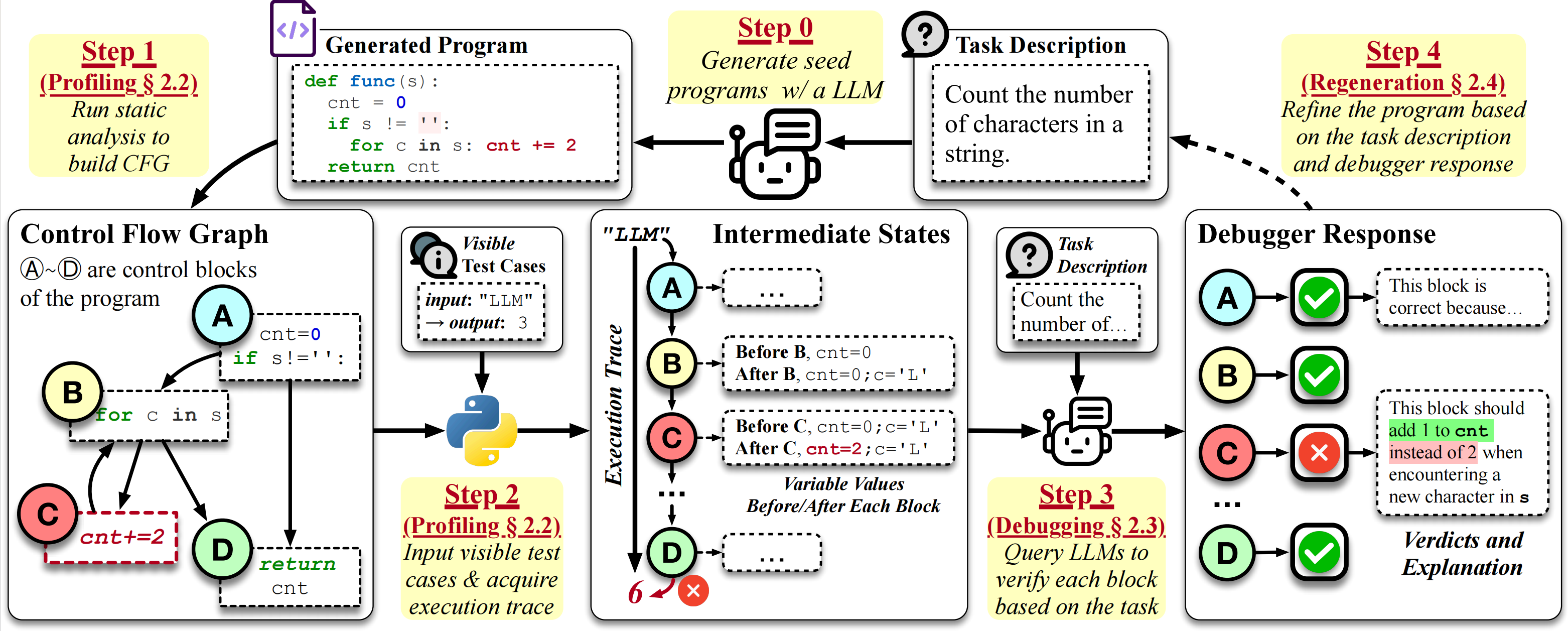This repository contains the code and dataset for our paper Debug like a Human: A Large Language Model Debugger via Verifying Runtime Execution Step-by-step.(ACL 2024)
We introduce 🛠️LDB, a novel debugging framework that enables LLMs to refine their generated programs with the runtime execution information. Specifically, LDB imitates how human developers debug programs. It segments the programs into basic blocks and tracks the values of intermediate variables after each block throughout the runtime execution. This allows LLMs to concentrate on simpler code units within the overall execution flow, verify their correctness against the task description block by block, and efficiently pinpoint any potential errors.
📢 We update results of LDB on GPT-4o. It achieves accuracy of 98.2% based on seeds from Reflexion!
conda create -n ldb python=3.10
conda activate ldb
python -m pip install -r requirements.txtIf you use OpenAI models as backbones:
export OPENAI_API_KEY=[your OpenAI API Key]If you use starcoder or codellama, we recommend to setup an OpenAI compatible server based on vLLM. Here is the instruction Setup vLLM backbones.
cd ./programming
./run_simple.sh [dataset] [model] [output_dir]The result is in output_data/simple/[dataset]/[model]/[output_dir].
Available options:
| Option | Value |
|---|---|
| dataset | humaneval, mbpp, transcoder |
| model | gpt-3.5-turbo-0613, gpt-4-1106-preview, starcoder, codellama (codellama/CodeLlama-34b-Instruct-hf) |
Run the script:
cd ./programming
./run_ldb.sh [dataset] [model] [seed] [output_dir]The result is in output_data/ldb/[dataset]/[model]/[output_dir]
Available options:
| Option | Value |
|---|---|
| dataset | humaneval, mbpp, transcoder |
| model | gpt-3.5-turbo-0613, gpt-4-1106-preview, starcoder, codellama (codellama/CodeLlama-34b-Instruct-hf) |
| seed | Path to the seed program you want to debug. You can find the seed programs we use in experiments in input_data/[dataset]/seed/[model]/seed.jsonl. |
We use the OpenAI compatible server based on vLLM. Please refer OpenAI-Compatible Server for detailed instructions to setup the local servers. To start the server:
python -m vllm.entrypoints.openai.api_server --model bigcode/starcoderLDB automatically sets up the connection to your local servers when you specify model starcoder or codellama.
If your server port is not the default 8000, please set the option --port in run_simple.sh or run_ldb.sh to your local server port.
LDB provides APIs for debugging and generating code with the debugging messages:
class PyGenerator:
ldb_debugldb_debug(self, prompt: str, prev_func_impl: str, failed_test: str, entry: str, model: ModelBase, prev_msg: List[Message], dataset_type: str = "", level: str = "block")
Args:
prompt (str): Text description or the code to be translated.
prev_func_impl (str): Implementation of the previous function.
failed_test (str): One failed test.
entry (str): Entry point where debugging is initiated.
model (ModelBase): Model used for debugging. The values could be 'gpt-3.5-turbo-1106', 'gpt-4-1106-preview', 'StarCoder', 'CodeLlama'.
prev_msg (List[Message]): Previous debugging messages and information.
dataset_type (str, optional): Type of dataset being processed. The values could be 'HumanEval' for text-to-code tasks, and 'TransCoder' for C++-to-Python translation tasks.
level (str, optional): Level of debugging to be performed. Default is "block". The values could be 'line', 'block', 'function'.
ldb_generate(self, func_sig: str, model: ModelBase, messages: List[Message], prev_func_impl: Optional[str] = None, failed_tests: Optional[str] = None, num_comps: int = 1, temperature: float = 0.0, dataset_type: str = "") -> Union[str, List[str]]
Args:
func_sig (str): Signature of the function to be generated.
model (ModelBase): Model used for code generation. Possible values: 'gpt-3.5-turbo-1106', 'gpt-4-1106-preview', 'StarCoder', 'CodeLlama'.
messages (List[Message]): Debugging messages and information.
prev_func_impl (str, optional): Implementation of the previous function.
failed_tests (str, optional): A failed test (this arg is not used in this function).
num_comps (int, optional): Number of completions to generate. Default is 1.
temperature (float, optional): Sampling temperature for text generation. Default is 0.0.
dataset_type (str, optional): Type of dataset being processed. Possible values: 'HumanEval' for text-to-code tasks, 'TransCoder' for C++-to-Python translation tasks. Default is an empty string.
Returns:
Union[str, List[str]]: Generated code or list of generated codes.
"""
Here is an example for debugging one round:
# One round debugging
gen = PyGenerator()
messages = gen.ldb_debug(prompt, code, test, entry_point, model, "", dataset_type, "block")
fixed_code, messages = gen.ldb_generate(
func_sig=task,
model=model,
prev_func_impl=code,
messages=messages,
failed_tests=test,
dataset_type=dataset_type,
)
For more details, see the example usage in our demo.
If you have any questions, feel free to post issues in this repo.
If you find our work helpful, please cite us:
@inproceedings{zhong2024debug,
title={Debug like a Human: A Large Language Model Debugger via Verifying Runtime Execution Step by Step},
author={Zhong, Li and Wang, Zilong and Shang, Jingbo},
booktitle={Findings of the Association for Computational Linguistics ACL 2024},
pages={851--870},
year={2024}
}
Our implementation adapts code from Reflexion and staticfg. We thank authors of these projects for providing high quality open source code!




